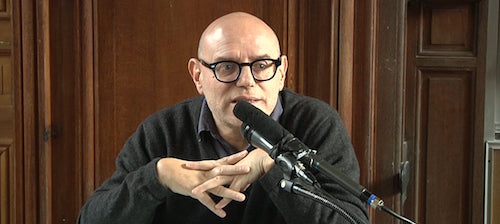The Lucidity of the Defeated: Enzo Traverso on left melancholy

Jean Birnbaum's profile of Enzo Traverso first appeared in Le Monde. Translated by David Broder.
The leftist ferment of the 1960s–70s is unthinkable except in the context of a certain Communist "bath water." Often the generation becoming alive to politics at that moment had been radicalised in response to their Communist parents — parents that "not everyone was lucky enough" to have. Later, in 1989, the old ‘68ers who had revolted against their "Stalinist" mums and dads would see it all disappear — not only the bath water but its babies and even the babies of its babies… In the moment that they were themselves meant to take over responsibility as parents, they found themselves orphaned twice over. Both their revolt and the world they had railed against were no more.
In this sense Enzo Traverso’s journey seems very typical. The historian of ideas, who today teaches at Cornell University, was born in Gavi, northern Italy, in 1957. His father — an employee at a chocolate maker’s — became the town’s Communist mayor. His mother was a primary school teacher and left-wing Catholic. "In short, a very Italian family — a Catholic-communist one," as Traverso puts it. We ask him what his first political memory is: "Meetings in our house, with workers, a few peasants, former Resistance activists, and, in the middle, my father, who had a diploma and acted as an intellectual even though he had not been to university."
And his first demo? "In 1973 when I was still in high school, I took part in the campaign against Pinochet’s coup in Chile. From then on the radical Left was the site of my socialisation, and it was there that I discovered literature, cinema, and sexuality." It is an era that is difficult to imagine today, a time in which a Communist father could quietly take joy in his son becoming a Trotskyist and his daughters feminists. The reason? "‘The young people joining the Communist Party seemed to him to be little arrivistes," Traverso smiles boyishly.
"My attraction to Paris was irresistible"
Spontaneous internationalists, the Traverso children looked abroad and first of all to Germany. Along with one of his sisters who today teaches in Berlin, Enzo was attracted by German culture. But in 1985 he instead chose France, where he wrote his thesis (on Marxists and the Jewish question) supervised by the French-Brazilian sociologist Michael Löwy. "I didn’t find German cities very attractive — they were ugly, even. But my attraction for Paris, the intellectual and cosmopolitan metropolis, was irresistible! Löwy introduced me to intellectuals from all around the world, above all Latin Americans. So I moved to France, even though my mental projection was still directed at Germany."
Traverso’s books bear witness to this loyal "projection." His privileged points of reference include the German (and "nomadic") thinkers Siegfried Kracauer – object of his 1996 essay published by La Découverte — and Walter Benjamin, who is once again very much a presence in his new book Mélancolie de gauche.
We find one same red thread running from text to text: history seen from the margins, bearing the conviction that the "defeated" have a particular lucidity, whereas the "victors" constantly seek and find reassurance for their own choices. For Traverso preserving this critical view is even more necessary after 1989, now that the hope of emancipation risks simply being forgotten.
A painful paradox
Here, moreover, there emerges a sad irony of history, or at least a painful paradox. How can we understand an intellectual trained in anti-Stalinist Marxism, who has himself devoted a remarkable anthology to totalitarianism (Totalitarisme, Paris: Points, 2001), considering the fall of the Berlin Wall a dark day? Was this the ultimate victory of a Stalinism that stole hope in socialism even from the minds of its left-wing critics?
Traverso baulks at such a remark: "Yes, in 1989 we could rejoice but since 1990 we have become aware what an enormous defeat this was. Not the defeat of the authoritarian regimes, but the defeat of the revolutions of the twentieth century and the defeat of an alternative to capitalism. For example, the Italian Communist Party disappeared overnight: its culture was completely abandoned, with no critical assessment ever being made. Since then there has been paralysis, in Italy as elsewhere. And if we are seeing attempts to reconstruct new practices, this is in a context marked by the eclipse of utopias and a void of memory. Ten days ago at Cornell I was asked to take part in a debate on the theme 'Is Trump a fascist?’ I answered ‘Trump is as much a fascist as Occupy Wall Street or Nuit Debout are communist!’ There is no possible genealogy between these movements. Such a void in the memory is perhaps the result of my generation’s failures."
At this moment silence takes hold: without doubt, the same silence that did so much to destroy the spread of hope between the generations. And before saying goodbye we agree on this warning to the "radical intellectuals" who today seduce part of the youth: rebellion cannot bet on amnesia; melancholic critique is the condition of all critical thinking.